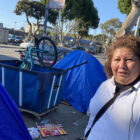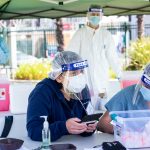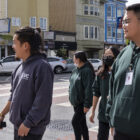In the dark and chilly early hours of Thanksgiving, thousands of people filed onto ferries to Alcatraz, the island in San Francisco Bay where the federal government once operated a prison. They were there for the annual Indigenous Peoples Sunrise Gathering, this year marking 50 years since an occupation of the island that sparked a movement.
In November 1969, a group of around 70 indigenous young people who called themselves “Indians of All Tribes” sailed to and began living on Alcatraz. Under the Treaty of Fort Laramie, unused federal land was supposed to be open to be claimed by Native Americans, and the prison had been shut down in 1963.
The occupiers, some of them families with young children, were able to stay for nearly 19 months. Signs of the occupation have been carefully preserved by the parks service and can be seen by visitors. But the occupiers themselves were removed by US marshals in June 1971, after electrical power and telephone service had been cut off, and a fire had destroyed many of the island’s buildings.
Some of the original occupiers, including Dr. LaNada War Jack, returned this year for the 50th anniversary. Other participants came to share visions for the work they do in their communities, taking on problems ranging from sex trafficking to substance abuse. Many at the event wore accessories or held signs with the letters MMIW, which abbreviate Missing and Murdered Indigenous Women and Girls. In 2016, more than 5,700 missing American Indian and Alaska Native women and girls were reported to the National Crime Information Center. The US Department of Justice’s federal missing persons database only logged 116 cases.
“50 years ago, we came out here and took an island. We had no idea what was going to happen…I’m very fortunate and lucky, because not many of us are here from that time, but those of us that are here, we’re grateful and thankful to be here with our lives.” – LaNada War Jack
Several of the speakers at the gathering brought dispatches from movements opposing projects like the Dakota Access Pipeline. Others are working to learn and teach indigenous languages and cultures, many of which were violently repressed. But one message repeated by several speakers was a call to foster solidarity across nations and cultures, from Hawaii to Palestine to the NFL. Colin Kaepernick, the quarterback who silently protested against police shootings of African Americans by kneeling during the national anthem, and was subsequently frozen out of the sport almost entirely, made his second appearance at the sunrise gathering in recent years.

A segment from our radio show, “Civic.” Listen daily at 8 a.m. and 6 p.m. on 102.5 FM in San Francisco.










